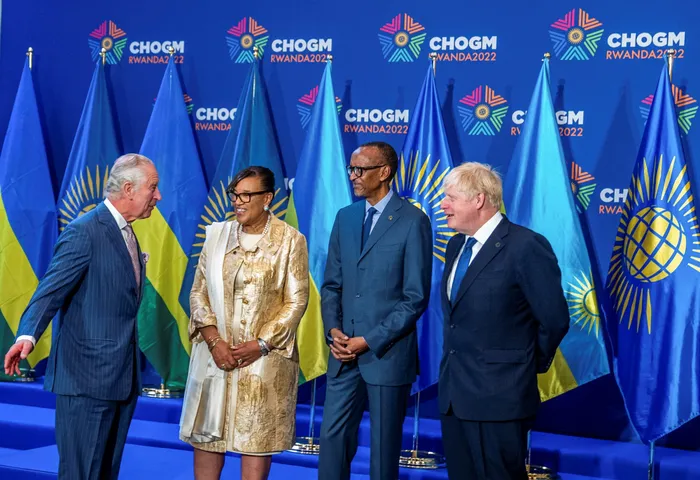Is the Commonwealth pomp and ceremony or can it play a more critical role?

Picture: Jean Biziman/Reuters - Britain's Prince Charles, Commonwealth Secretary-General Patricia Scotland, Rwandan President Paul Kagame and British Prime Minister Boris Johnson, attend the opening ceremony of the Commonwealth Heads of Government Meeting (CHOGM) in Kigali, Rwanda, June 24, 2022.
By Isobel Frye
With the passing of Queen Elizabeth II there has been much opinion and some analysis about the extent and the limits of the ruling powers of a sitting monarch of the House of Windsor.
As a leader the Queen had draw, but she was scarcely a ruler, beyond perhaps of the royal household. There has also been much discussion about the appropriateness or continued relevance of the Commonwealth (of Nations), the body that offers membership to many of the former colonies of Britain, in modern times. Is there swag to be had from belonging to this club?
Beyond the photo opportunities offered by the biennial Commonwealth Heads of Government Meeting, membership seems to be as ceremonial as the British monarchy. Perhaps this might change if the Commonwealth was headed not by King Charles III but by an elected leader of the members themselves.
The initial Commonwealth was formed in 1931 with six initial members – Britain, Ireland (who left when it became a republic in 1949), South Africa (who left for the same reason in 1961), Australia, New Zealand and Canada. The current Commonwealth was reconstituted with eight members after the Second World War in 1949 with the addition of India and Pakistan and Sri Lanka (Ceylon) to co-operate for ‘peace, liberty and progress’, united as ‘free and equal’ members. Since then membership has grown to 56 countries with a combined population of over 2.5 billion people.
There are two organisations that share similar characteristics with the Commonwealth, namely the Organisation Internationale de la Francophonie (OIF) and the Community of Portuguese Language Countries (CPLP) established by France and Portugal respectively.
Interestingly recently some countries are affiliated in various ways to more than one. Togo and Gabon, both members of La Francophonie, have applied to join the Commonwealth.
Ghana has been an affiliate member of La Francophonie since 2006 and is now applying for full membership, but at the same time remains a full member of the Commonwealth. If we judge value by demand, it is interesting to note that in 2018 the Maldives applied to re-join the Commonwealth under their incumbent President Ibrahim Mohamed Solih, overturning his predecessor’s withdrawal from the Commonwealth two years previously, a withdrawal prompted by the Maldives objections’ to having to address questions about alleged human rights abuses and standards of democratic practice.
Most members are former colonies of the British empire, and it is Empire rather than the Commonwealth that seems to be the more contentious concept. And ironically, given the history of Empire, enforcing human rights standards is one of the Commonwealth’s roles these days. The core values of the Commonwealth are to promote democracy, good governance, peace and the rule of law.
The irony of course lies in the history of exploitation and colonial abuse that was experienced throughout the British Empire. While there remains a narrative offered by those, such as conservative historian Niall Ferguson who claimed that Britain “developed”
India, this is widely contested. A 2019 collection of essays edited by Shubhra Chakrabarti and Utsa Patnaik painstakingly and painfully set out, using nearly two centuries of detailed data on tax and trade, how Britain appropriated from India through a variety of methods a total of nearly $45 trillion between 1765 to 1938. And of course in 1783 13 American colonies won independence from Britain asserting an end to taxation of their profits, but only after a very bloody war.
So the question of what membership of the Commonwealth offers today is a pertinent one.
For a body of developing countries faced with a world that has shifted from Aid to Trade, it might be useful for the Commonwealth to help build markets with established blocs. It is surprising that the focus of the Commonwealth is to “help boost trade between member countries, to create prosperity for all”. Preferential trading agreements are negotiated at a national and a supra national level, such as the African Continental Free Trade Area agreement, but it would seem that for the Commonwealth to add value to members’ trade, it would do well to see beyond its closed shop of members for markets.
Historically the Commonwealth is made up of former colonies of the British empire, countries that were conquered precisely so that Britain could access their raw materials that were needed to feed her voracious demand after the Industrial Revolution. So the lack of any strategic marketing of the member countries’ commodities to non- members is odd.
However, that new members are applying to join and former members are seeking to be readmitted suggests that value is perceived on the ground at least.
The question of who should be head of the Commonwealth is something that has also received attention in recent times. This is an office that has no fixed term, and has executive functions. The head of the Commonwealth does not have to be the sitting monarch. A reform that might evidence renewal and deliver innovation could be a decision to elect a leader from the membership itself.
Such a reform might raise a whole new political fracas amongst members, but it might be an effective way for the Commonwealth to gain greater legitimacy and to ensure that its priorities reflect those of its members, and it is not evident that King Charles III will have the vision and energy to drive the Commonwealth as one of his new priorities.
Frye is director of the Social Policy Initiative
This article is original to the The African. To republish, see terms and conditions.